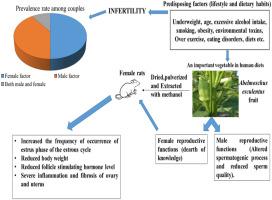Reproductive effects of Abelmoschus esculentus fruit methanol extract in female Wistar rats
Abstract
Current researches aim at identifying modifiable risk factors for infertility, particularly dietary lifestyle. Abelmoschus esculentus is one of the important vegetables in the human diet with reported valuable nutrients but has been linked with reproductive dysfunction in males. This study investigated the reproductive effects of Abelmoschus esculentus fruit methanol extract in female Wistar rats. Dried Abelmoschus esculentus fruit was extracted with methanol. Fifteen female Wistar rats (180–200 g) grouped into three (n = 5) received 1.0 mL/kg/day distilled water (control), 70 and 200 mg/kg/day of the extract once daily for 21 days via oral gavage. The estrous cycle was assessed using Marcondes and Papanicolaou methods. The histology of the tissues was evaluated by microscopy. Serum follicle-stimulating hormone, luteinizing hormone, and estrogen levels were measured using an enzyme-linked immunosorbent assay. Tissue antioxidant activities and malondialdehyde levels were assayed by spectrophotometry. Data were analyzed using the Analysis of variance at a significance of p < 0.05. The estrous cycle of the Abelmoschus esculentus fruit methanol extracts treated rats showed normal cellular characteristics. Though Abelmoschus esculentus fruit methanol extract increased the antioxidant activities, it reduced the body weight and follicle-stimulating hormone level and caused severe inflammation and fibrosis of the ovary and uterus. Abelmoschus esculentus fruit methanol extract adversely altered the reproductive functions of female Wistar rats by disrupting the ovarian and uterine cytology and reducing hormone levels.


 求助内容:
求助内容: 应助结果提醒方式:
应助结果提醒方式:


